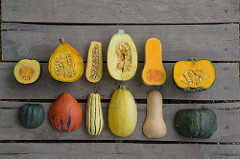Cucurbita; Squash; Pumpkin: seeds

Winter squash (Cucurbita), including pumpkin, seeds for breast enlargement and health benefits.
Etymology
Curcurbita is the genus of plant referred to as squash. It belongs to the gourd (Cucurbitaceae) family, which includes watermelons and cantaloupe.
Winter squash is defined by certain squash that is left to grow through more seasons to a larger size. Pumpkin is a winter squash that includes varieties of Cucurbita pepo, Cucurbita maxima and Cucurbita moschata.
Hormone balance

Shelled winter squash seeds can increase the response of estrogen in the body depending on the presence of other surrounding hormones or phytohormones. It contains phytochemicals which bind to the potent androgen dihydrotestosterone (DHT), likely circumstantially lowering its effects. Conditionally, pumpkin seeds can improve estrogen balance. There is anecdotal evidence that under the right hormonal conditions that pumpkin seeds increase estrogen conversion.
Squash seeds contain lignans, which anecdotally seem to amplify present steroid hormone effects on estrogen receptor beta (ERβ).
Anti-cancer property
Pumpkin seed has an effect against hormone receptive cancer cells.
Use
Cucurbita for breast enhancement
Squash seeds can likely replace sunflower seeds for herbal breast enhancement. Squash seed's effect on ERβ means potential for wider hips. Seeds with properties similar to squash are required in the right proportions to other herbs for a fully positive outcome that includes breast enlargement. Use pumpkin seed to lower swelling during proliferative and luteal phases according to those applicable herb schedules. 1 pumpkin seed can be used during menses to lower brown spotting: this may be difficult to believe, but you can see the effects. Too much pumpkin seed may cause unwanted symptoms such as cramps.
Cucurbita or herbs with similar properties are in herb programs based on menstrual phases. There must be balance throughout phases, and combinations of herbs help the body acheive balance for health, breast growth and hip growth. It's important that menses is light and short. Also, preventing an excess of negative symptoms for menses helps set the balance for proliferative phase. Luteal phase uses a different combination of herbs than proliferative phase for symptoms. For a simplified herb schedule, where there's commonality of herb recommendations for symptoms such as swelling and signs of excess estrogen, use nonmenses. BCP01 is a composite page of pieces of different programs on birth control or IUD use.
Herb timing and combinations' success for breast enhancement relies on menstrual phases. Descriptions and pictures of results from herb combination use can be seen in programs. For more guidance, see guide, or hirsutism-topic.
For hormone balance
Pumpkin seeds are useful against certain parasites.
As an anti-wormer (anthlemintic), winter squash seeds have a limited effect against particular intestinal parasites. Seeds of Cucurbita pepo, Cucurbita maxima and Cucurbita moschata had an effect against some, but not all, types of intestinal worms. Towards certain species of intestinal worms, Cucurbita pepo harmed parasite development, ability, larva and eggs.
Berberine and palmatine contained in Cucurbita pepo seeds have an effect against Toxoplasma gondii. However, there is uncertainty as to how effective Cucurbita is against this parasitic protozoa.
Similar herbs
Pumpkin seed and sunflower seed are direct replacements for each other, while the amount of pumpkin seed to recommendations of sunflower seed may differ. Barley is a possible replacement for pumpkin and sunflower seed. Lavender has the same effects as sunflower and pumpkin seed, but its effects may be too strong than what is needed.
Precautions
See precautions for more details of care to be taken with herb use. Proper nutrition is a consideration for health. Also, check for the latest blog updates about herb and hormone safety.
It is very important that menses be light and not prolonged.
If you have hirsutism, PCOS, hot-flashes, other signs of hormone imbalances, see estrogen-imbalance, and hirsutism program journals at hirusitism-topic before trying herbs.
Herb concentrates can be tens of times more potent by weight than herbs in solid form. This can easily lead to hormone imbalances. For this reason, concentrate extracts are not recommended for extended or excessive internal use, especially during fertility years. Concentrates shouldn't be used to overcome plateaus. Another issue with herbal extracts, is that they may not have the full range of properties of the herb. Essential oils are not recommended for breast enhancement. If opting to use herbal extracts, use food grade extracts, with no more than 1 drop at a time diluted in water.
More


For the latest herb programs and how to get started, see: guide. Pictures of breast enhancement can be seen in the program journals of Anon02, Anon08, Anon09, Bubblemelon and Jellie.
For resources on hips and butt enhancement, see: /appendix/hips-butt-enhancement and /appendix/kettlebell.
breast-endocrinology.pdf describes the science of breast development and endocrinology. It also describes symptoms related to hormone imbalances. Biology and hormone imbalances are excerpts from this ebook. breast-endocrinology.pdf uses a Creative Commons (CC BY-ND 4.0) license.
Breast.is blog
References:
- The role of Cucurbita pepo in the management of patients affected by lower urinary tract symptoms due to benign prostatic hyperplasia: A narrative review. https://www.ncbi.nlm.nih.gov/pubmed/27377091.
- Pumpkin seed extract: Cell growth inhibition of hyperplastic and cancer cells, independent of steroid hormone receptors. https://www.ncbi.nlm.nih.gov/pubmed/26976217.
- Evaluation of Anthelmintic Activity and Composition of Pumpkin (Cucurbita pepo L.) Seed Extracts—In Vitro and in Vivo Studies. https://www.ncbi.nlm.nih.gov/pmc/articles/PMC5037735/.
Etymology & Definitions:
- Encyclopædia Britannica: Squash. https://www.britannica.com/plant/squash.
- Encyclopædia Britannica: Pumpkin. https://www.britannica.com/plant/pumpkin.
- The Plant List: Cucurbita. http://www.theplantlist.org/1.1/browse/A/Cucurbitaceae/Cucurbita/.
